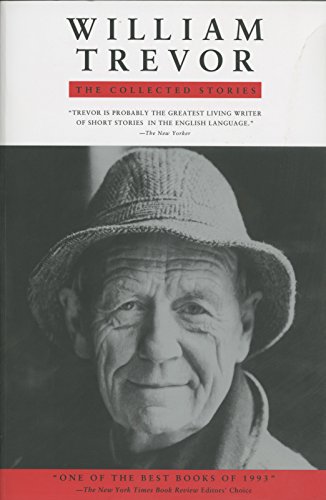Sex, in Trevor’s oeuvre, is dirty. I don’t just mean that the sex is perverse, or pornographic, although it sometimes is—but however the act is performed, and whatever particular kink might be desired or sated, in the larger sense sexuality itself is spiritually foul and sullying. It makes cuckolds out of some husbands and cheaters out of the others; it makes whores out of wives; it makes fools and felons out of young boys, and victims out of the girls they desire. It represents ruination and woe for everyone.
Surely, this jaundiced view of the act of love arises most straightforwardly and explicably from Catholic guilt, but it seems more complicated and in a way global than that. Sex, in Trevor’s oeuvre, is shorthand for the depredations and contingencies of the adult world. In story after story in the Collected, a virginal innocent is at last confronted with the terrible fact of sexual life, with sex posited as a kind of experiential Rubicon across which a person cannot return. One a person has bitten from that apple, they are cast from the Eden of childish fantasy into a hellish, horizonless desert of middle-aged duty: marriage to a despised mate, siring a brood, working a terrible job, telling the same jokes to the same crew at the same pub over the same pint of stout.
In “Music,” the virginal dreamer is Justin Condon, a traveling salesman of women’s undergarments (ironic, that), who lodges during the week in County Waterford at the house of a widowed Mrs. Keane. There, he endures the raunchy stories of Mr. Fahy—this story’s representative of the debauched adult world—who couples with Mrs. Keane after everyone else has gone to bed; everyone else includes Thomasina Durcan, a traveling dentist, who is sweet on the unresponsive Justin. Wherever he goes, selling his wares, shopkeepers ask after his retired salesman father, a vulgar drunken brute cut from Mr. Fahy’s cloth. In the midst of all this filth and debasement, Justin takes solace in his fantasies of becoming a famous Mahleresque composer, a fantasy encouraged in his childhood by a neighborhood woman, Aunt Roche, who enlists the help of a piano playing priest, Father Finn, to instruct Justin twice a week at Aunt Roche’s. Father Finn encourages Justin over the years, telling him he has promise. But in the end, it is revealed that Justin was merely a pretext to allow Father Finn and Aunt Roche to carry on their own affair, and Justin stalks out of Aunt Roche’s house while swearing at her, headed toward the grim fate of Thomasina Durcan and marriage, a life like his father’s, the normal fate of all men.
I feel conflicted now, as I often do, when confronted with Trevor’s authorial aversion to sex. On the one hand, it is undeniably a part of his art, and to a large extent gives it strength and texture. These kinds of “unhealthy” preoccupations often do provide a short story author a kind of recurring thematic gravity—Flannery O’Connor’s mothers, Richard Yates’s invalids, Denis Johnson’s addicts: these worries and doubts and dreads may possibly spring from real problems (to be clear, I have no idea what Trevor’s personal life was like, other than that he was married and had children), but they can be a narrative wellspring.
On the other hand, in Trevor’s case, it sometimes feels like a failure of his art, the inability to imagine the vast vista of sexual life as anything other than a monochrome field of disgusting failure and compromise. That is, to be sure, one way of viewing things—and a memorable one, at that—but it is pitifully incomplete. What about love, and leaving aside love, what about pleasure, even the pleasures of degradation? I have argued before in this substack for the power of Trevor’s pre-therapeutic worldview, and I would not wish for a “healthier” Trevor, but even within the relatively darkened confines of simple lust, there are huge, rich tracts of behavior and motivation left unexplored.
I object to this reflexive view—to the extent that I do object—because it is fictionally, artistically limiting. It posits the threshold of sexual maturity as a line bordered on one side by the technicolor fantasia of childish dreams and on the other by the drab gray world of adult reality. In the first place, although this view touches on some truths about life, it is also clear nonsense. In the second place, it ignores a universe of fictional possibility. “Music” is a good, strong, clear story of a type Trevor had, by this point in his career, written many times. I enjoyed it, but I would enjoy another story, a story for instance in which Justin sleeps with, perhaps falls in love with Thomasina Durcan, a story in which we see his dreams tested by the contingencies of another human person, as they so often are in the real world.









